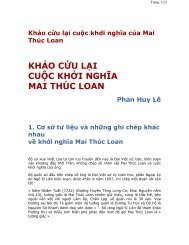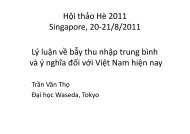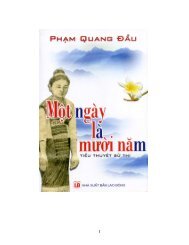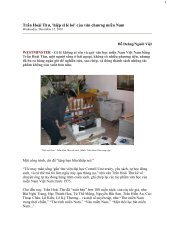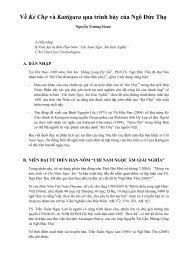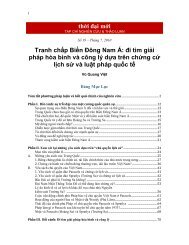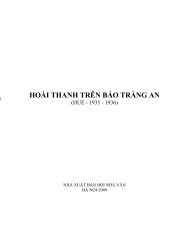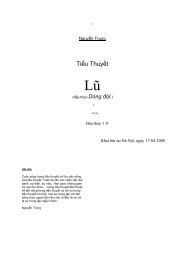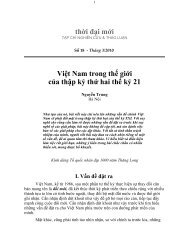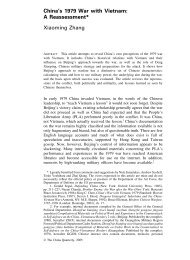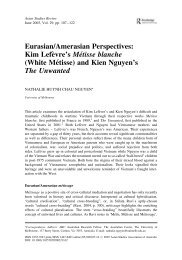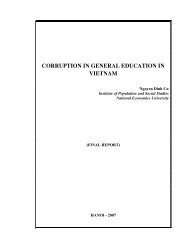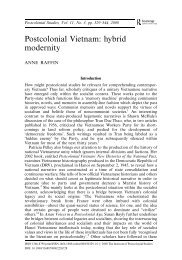John T. McNaughton and Vietnam: The Early Years as ... - Viet-studies
John T. McNaughton and Vietnam: The Early Years as ... - Viet-studies
John T. McNaughton and Vietnam: The Early Years as ... - Viet-studies
Create successful ePaper yourself
Turn your PDF publications into a flip-book with our unique Google optimized e-Paper software.
BENJAMIN T. HARRISON AND CHRISTOPHER L. MOSHER 499<br />
George Ball is generally regarded <strong>as</strong> the lone dove in the Kennedy<br />
<strong>and</strong> <strong>John</strong>son administrations. He w<strong>as</strong> known to be a eurocentrist so that<br />
colleagues e<strong>as</strong>ily ignored his opposition. 14 But <strong>McNaughton</strong>’s views were<br />
not so e<strong>as</strong>y to dismiss. Besides, Ball’s job in the state department w<strong>as</strong> to<br />
develop strategies <strong>and</strong> policies. <strong>McNaughton</strong>’s job in the Pentagon w<strong>as</strong><br />
to formulate options <strong>and</strong> tactics for implementing policy. When Ball<br />
dissented, he made it clear that whatever policy w<strong>as</strong> decided upon, he<br />
w<strong>as</strong> ‘committed’. 15 By contr<strong>as</strong>t, <strong>McNaughton</strong> saw himself in the role of<br />
an unbi<strong>as</strong>ed attorney defending a client. He would make his c<strong>as</strong>e to<br />
McNamara <strong>and</strong>, if his arguments were rejected, he would move on to<br />
fight another day. After all, it w<strong>as</strong> clear that <strong>John</strong>son could not conceive<br />
of defeat in <strong><strong>Viet</strong>nam</strong>. Moreover, the commitment that led to a major<br />
escalation of the <strong><strong>Viet</strong>nam</strong> War had already been made by the time<br />
<strong>McNaughton</strong> became <strong>as</strong>sistant secretary of defense in 1964. He had to<br />
select bombing targets even <strong>as</strong> he presented re<strong>as</strong>ons for getting out of<br />
<strong><strong>Viet</strong>nam</strong>. His colleague at Harvard, Roger Fisher, explained:<br />
<strong>McNaughton</strong> did more sustained thinking about the benefits of both<br />
escalation <strong>and</strong> withdrawal than any of the advocates of either position . . .<br />
He w<strong>as</strong> an expert on dealing within the realm of the possible. If it seemed<br />
certain that an idea would not now be accepted, he would bide his time. 16<br />
Alternatives were not e<strong>as</strong>y to come by in a war that <strong>McNaughton</strong> had<br />
already said would require lobotomies for success. As he so shrewdly<br />
observed, the situation in <strong><strong>Viet</strong>nam</strong> w<strong>as</strong> a c<strong>as</strong>e of the United States giving<br />
illegitimate birth to South <strong><strong>Viet</strong>nam</strong>.<br />
© 2007 <strong>The</strong> Authors. Journal compilation © 2007 <strong>The</strong> Historical Association <strong>and</strong> Blackwell Publishing.<br />
17<br />
In his opinion, the United States<br />
had given birth to a country that had no legitimacy because its own people<br />
did not support it.<br />
<strong>John</strong> <strong>McNaughton</strong> w<strong>as</strong> convinced that the lack of popular support for<br />
the government of South <strong><strong>Viet</strong>nam</strong> w<strong>as</strong> the main re<strong>as</strong>on why the United<br />
States should not even be there in the first place. James C. Thomson, Jr.,<br />
an aide to the Bundy brothers<br />
18<br />
at various times, talked to <strong>McNaughton</strong><br />
about what w<strong>as</strong> wrong with US involvement in <strong><strong>Viet</strong>nam</strong>. <strong>The</strong> <strong>as</strong>sistant<br />
secretary of defense sarc<strong>as</strong>tically responded, ‘You don’t really think we<br />
should be there?’ When Thomson left government in 1966, <strong>McNaughton</strong><br />
tried to persuade him to stay on <strong>as</strong> a staff member in the Pentagon.<br />
Thomson responded that would be hard for a ‘through <strong>and</strong> through<br />
deep-dyed peacenik’. <strong>McNaughton</strong> quickly replied, ‘Do they know that<br />
on the outside?’ Thomson answered that he did not think anyone outside<br />
the government knew of his dovishness. <strong>McNaughton</strong> w<strong>as</strong> ecstatic,<br />
See David L. DiLeo,<br />
14<br />
1991).<br />
15<br />
George Ball, <strong><strong>Viet</strong>nam</strong> <strong>and</strong> the Rethinking of Containment (Chapel Hill, NC,<br />
A. J. Langguth, Our <strong><strong>Viet</strong>nam</strong>: <strong>The</strong> War, 1954–1975 (New York, 2000) [hereafter Langguth, Our<br />
<strong><strong>Viet</strong>nam</strong>],<br />
p. 378.<br />
16 ‘Letter to the Editor’, New Republic,<br />
5 Sept. 1967, p. 44.<br />
17 JTM Papers, Box 2, File V, #34, 5 Nov. 1964, LBJL.<br />
18 McGeorge Bundy served <strong>as</strong> National Security Advisor. His brother, William P. Bundy, w<strong>as</strong><br />
<strong>McNaughton</strong>’s predecessor at the Pentagon before becoming <strong>as</strong>sistant secretary of state.



